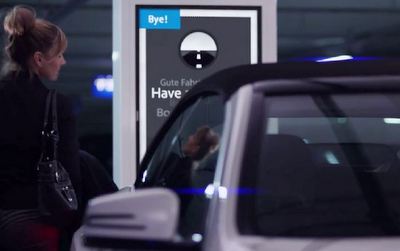In a new twist on automatic garaging, Düsseldorf Airport is now offering travellers the latest in valet parking technology, as reported by the Washington Post. A self-driving robotic forklift, named Ray, manages the task with ease, utilising laser navigation and mapping software to gently deliver your car to its parking spot. The agile forklift technology allows cars of any size to be parked efficiently and compactly. But the real news here is the integration of the customer’s travel details and flight info that takes this “smart parking” to a new level.
The robotic forklift system, designed by Serva Transport Systems, allows drivers to leave their car after checking in on a digital screen. The system assesses and stores the car dimensional details (allowing it to be parked efficiently with cars of similar size) as well as the travellers’ flight details, so that Ray can have your car ready and waiting for you on your return.
Cars are automatically shuffled around by Ray to keep the soon-to-be-collected cars on hand. If you have indicated on check-in that you will check a bag, Ray knows to wait until the baggage for your flight has been distributed. The system also uses a smartphone app so you can communicate your impending arrival to Ray. If your flight is delayed, don’t stress! The information in the system is automatically updated with all flight info, and Ray will make sure that your car is held back until you arrive.
As the system relies on self-driving forklifts, it can be used in existing structures, without the large retrofit investment required with some of the autonomous conveyor belt and lift systems. Serva Chief Executive, Rupert Koch suggests that the space saving benefits of using a robotic system can increase parking capacity by up to 40%. Serva is expecting this pilot will generate interest in the system from other airports, logistics and manufacturing facilities, and car rental companies. The price tag of a basic system is reported to be around $1.2 million for two Rays, two transfer stations and associated software.

